#emily blunt was wasted
Text
Three Films and a Couple of Thoughts
22.07.23 - 10.08.23
My phone calendar for July was not just marked with bill payments and birthdays but also the release dates of three films, complete with an accompanying reminder that would inevitably light the screen, catch my attention, ensure that I was booking the tickets in time. The films were ‘Past Lives’, ‘Barbie’ and ‘Oppenheimer’. I watched all three of them with my partner, my usual film companion if I’m not watching something with our parents or you, and each of these experiences – Past Lives, 6.05PM show at INOX, Oppenheimer, 11.55PM show at Cinepolis and Barbie, 12pm noon show at PVR – was singular in its own way, for a myriad of reasons.
Notwithstanding the absurdly high prices of tickets where a Rs. 350 ticket starts to look ‘cheap’ (to me, the upper-middle class consumer, with enough liquidity to throw cash even at a coca cola priced at Rs. 360!!), what was it like to watch each of these films in the cinema? Let’s also not forget that all three of these films are, to varying degrees, in English or English-centric (since Past Lives is a mix of Korean and English, subtitled only in English), the implication being that the audiences for all of these will be English-understanding, if not English speaking etc. I think it’s important to note all of these things – the cost, the language, the space of the cinema itself – in the present moment, before diving into the ‘criticism’ / ‘opinion’ portion of my piece. The subtext of all this is: how communal of an experience does the cinema still provide? Who can afford the obnoxiously priced snacks and the reclining seats, let alone the ticket itself? Who has the ‘time’ to luxuriously book a noon time show, in the middle of a work day, or one late at night in a city like Delhi? With the rapidly intensifying need to show more and more ‘content’, as made obvious by the number of screens in a particular cinema ‘complex’ (no longer hall, no longer single screen), the question that also comes to mind is this: is consumption everything?
When I watched the trailer for Past Lives, I felt an appreciative nervousness that seems to be evoked by nearly all A24 films; the subtle promise that this movie, this narrative will shift the way you might think or feel things. After all, a film about a Korean-American woman, married to a white guy, who then runs into her childhood sweetheart, is a film that can open so many doors, invite so many questions, evoke that complex sense of yearning and uncertainty, while attaching it to memory-making and the politics of identity. So I went into the hall with this promise in mind, expecting a complex and touching narrative about love, identity, history…but by the first half, it was beginning to seem that I had expected too much. In the interval, when my partner and I stepped out to get popcorn, we exchanged only sceptical glances and no words, both perhaps trying to let the film run its course, refusing an early judgement or indictment, generous to a fault.
Past Lives is one of the most disappointing films I have ever had to watch in the cinema. Not only did I nearly fall asleep twice in the first half, the gaping holes in plot and the sheer lack of any chemistry, or depth in any of the relationships made me want to pull my hair out. The film seemed to think that unnervingly long, awkward-without-purpose silences between characters is all that a context of tenderness requires – this particular choice irked me throughout. Our protagonist meets her childhood crush repeatedly over the course of 20-30 years, after gaps that are decades long and their conversation amounts to this: did you eat anything today? – UNNECESSARY FORCED SILENCE - What prize do you want to win for your writing now? – UNNECESSARY FORCED SILENCE - Do you and your partner fight? - UNNECESSARY FORCED SILENCE – and so on and so forth. If in these year long intervals, they have gained no curiosity about each other nor the ability to hold a single engaging conversation, then perhaps they should stop pretending they’re in love. The absurdity does not stop here, with the pretend-serious quiet that forces the film into disfigured drivel, but extends to all other aspects of the film – the protagonist has a younger sister and a pair of parents mentioned only once in the film, never to reappear or be mentioned onscreen again, the protagonist is a writer who stops talking to her crush the first time round because she wants to write but we never get to see what she’s writing, or what her work life is like or anything ‘writerly’ at all, the protagonist meets her white husband at a retreat and the ONLY conversation they have is where she monologues in the most dry, unaffected manner about ‘in-yeon’, a seemingly ‘deep’ concept that gives literally no weight to the film but seems to be its alleged driving force, before we drift into their marriage that has, again, no depth, feeling, tension, nothing, and in one particularly galling scene when the protagonist invites her childhood crush to a dinner/bar scene with her husband, the two of them start out talking in Korean with her translating into English for her husband before descending entirely into Korean, excluding the husband from the exchange which is mirrored literally by the camera cutting him out the frame. Not only is this absolutely, unfathomably unreal and stupid, they also manage to discuss what a ‘life together’ might have been like….right there, with the ousted white guy sitting somewhere within earshot. How has this not come up before, you know, when they met like 5-6 times alone? How can anybody take their spouse out with an erstwhile crush/flame and proceed to ignore said spouse for hours on end, without any ramifications? How is the said spouse not even hurt a tiny bit? What is the logic of this film? What is the meaning of this film? Is it enough only to put one ‘deep’ Korean concept in, fill the run time with awful, hankering silences and characters that appear to be more cardboard than real people, and put some stringy-ambient music in the background – in order to make an ‘art’ film, a ‘stunning’ cinematic debut?
I call bullshit.
At the end of the film, my partner and I turned to each other and both of us said….WHAT? IS THAT IT? IS THAT WHAT WE PAID SO MUCH MONEY FOR, AND GAVE OUR TIME TO? It was in a senseless, almost slurring kind of disbelief that we walked back home, unable to articulate how awful the film really was, especially because it pretended so hard not to be anything but ‘touching’ and ‘simmering’ and ‘beautiful’? When we pulled out reviews of the film, the disbelief sky-rocketed to another level. Past Lives was a critically acclaimed film, by the measure of most, if not nearly all reviews. We kept shaking our heads, wondering if we’d watched another film, the wrong cut, or if we were just stupid. Was there something we didn’t understand? Were we the ones missing something, and not the film itself? After all, in varying publications and across platforms, it was being hailed as a ‘masterpiece’. And the only words we had for it were: bull-fucking-shit.
.
Oppenheimer was a midnight show, and we were running late, having had to look for parking and the cinema itself - of course we would arrive at the wrong shopping mall first. We missed the first five-seven minutes of the film, but got settled in quickly. A fair amount of time has elapsed since I watched the film so my thoughts aren't quite as dense or immediate - it was an interesting movie overall, with a number of elements that faltered and misspoke. Here's what I liked: the impeccable sound design, often a 'staple' of Nolan's films, the 'character' of Albert Einstein (perhaps acted too perfectly, in my opinion, a portrayal that teetered on the edge of whimsy but never became a caricature?), Cillian fucking Murphy making the most of a script that didn't fully grasp or even attempt to grasp the complexities of Oppenheimer's life or the bomb dropping itself, the popping up of random actors - though after a time, it became a bit tedious. Hello, Rami Malek, is that all you'll be saying?
It's also indicative that the cinema was predominantly 'male', full of tech bros and cishet men that had turned out en masse to rave about Nolan - I am late to the discourse surrounding his films and the women portrayed in them (awfully, poorly, tediously, repetitively awful etc etc) but of course that was one of my major issues with the film. Plenty of reviews about this. I remain unconvinced by a film that leaads up so heavily to a world-history changing bombing but refuses to show us even ONE visual of the devastation in Hiroshima and Nagasaki. It's not enough to show us this singular white man's 'guilt' (very sparsely, might I add) - for a film made in this day and age, it certainly doesn't seem to want to reckon with the sheer scale of violence this moment unleashed upon the world. To be preoccupied with 'Oppenheimer' is a lazier, easier choice and still the film meanders in the second half, a little too obsessed with the trial / American politics, rather than the absolutely real time ramifications of the bomb. The film seems almost forgiving, when it should perhaps adopt a more complex approach to Oppenheimer. Don't even start me on the women - that's a whole other shit show. Literally nothing works in that realm, not for even a second, is any woman onscreen remotely believable or real, or even realized as a person. So Nolan has bumbled a number of things in the film - in parts, the film felt likes three different films put together, the editing was quite poor and abrupt, the women utterly destroyed in favour of a boring trial and an all-too-easily-forgiven antagonist, without a moment taken to acknowledge the horror he brought upon the world through his world. Underwhelming and not well thought out, I'd say but I really enjoyed the way sound functioned throughout film. For those raving about the 'cinematography' or 'visuals' - friends, come on, it's alright, it's pretty standard. Some things do strike you but overall, it's just alright.
.
We were on time for Barbie. What a relief. After watching three films with missing beginnings (these two above, and even the new Spiderman film!), I was relieved to see WB ads playing out on the big screen. My partner was very sorry that neither of us were wearing pink - the cinema hall was flushed in said colour, mostly, and I liked how 'extra' it felt, almost exuberant? But at the same time, the company making Barbies now making films about barbies - do we get more meta in capitalism than this? Probably. But that subtext stayed with me.
On first thought, right at the first watch, I really enjoyed the film. I laughed a lot, and I laughed at how much my partner laughed because some of the humour really worked well. Funnily enough and like a small majority, Ken emerged as my favourite character over the course of the film. The production design and the music was very well done most of the time, and some of the writing was very crisp, very intelligent. There were some issues though - many of which emerged in my conversations with other viewers, as well as my partner, as we read through internet discourse, reviews, tweets, instagram hot takes and so on, rethinking many of our initial thoughts. Though Barbie remained very much a fun film, one that should certainly be watched in the cinema, there was a sense that this film was just fun.
A great bit of superficial fun, that did not try to gesture at deeper meanings, nor truly try to break gender binaries (because how could Barbies???? even as there is one radical moment where Barbie and Ken, in the real world, tell construction workers, that neither has genitals, a radicality immediately defeated by how binarised the worlds remain and perhaps the fact that Barbie goes to the gynaecologist, confirming the bio essentialist reality of her as a 'woman' idk). Even the Weird Barbie wasn't weird enough for me - wasn't unsettling enough, wasn't subversive enough, didn't possess any qualities that might offset the 'sweet' 'funness' of the Barbie universe. No character beyond Barbie or Ken were developed, especially the real world mother-daughter pair upon whom much action hinges, but who remain empty vessels, unrealized people with no interior lives or histories, nothing. That one monlogue that has garnered significant praise across the Barbie discourse was quite average, in my opinion - it did not force me to think deeper or did it connect with me very emotionally. In a landscape where we've broken gender right open and are actively trying to collapse boundaries, this film did little in that direction, but enforced these dualities instead. I don't think it even properly examined how patriarchy reduces men and harms them deeply too.
I came across a recent review that seemed to be arguing that Ken should have his own movie - because this movie is called 'Barbie' and it should be only about her!!! and I found this to be quite a reductive approach because if you're trying to examine patriarchy and gender roles (forget race or ethnicity guys, that's pushing it right now) - then we need as many narratives as possible in there, and it was very interesting to see a 'Ken'. I did not feel that he 'took over' filmic space meant for 'Barbie', or that his presence or storyline detracted from the larger narrative - in fact, often, he was the most entertaining, compelling aspect of the film. I love Margot Robbie and she's done an excellent job, but I think the film overpromises - as does much of the discourse/reviewing around it. It's a fun watch, surely and you'll be singing along and you'll love the visuals - kinda made me think of Katy Perry's California Gurls a bit (I could think of other references too but eh?) - but it's a surface level film. You kinda get what you see, and not much else. And that's alright, perhaps, because it is a film by a company that essentially makes these dolls that many of us spent our lives idealizing (and yes, breaking etc etc). So yeah, thanks Greta Gerwig but you did a lot better with your earlier films. Feminism doesn't really need Barbie at the moment, I think.
.
I'm all done here, in a bit of a rushed manner. I also semi-watched this film Unpregnant on the plane but I don't really have much to say except I'm glad I didn't finish because it didn't make me feel anything at all, really. Average, average, below average?
As for this coming month, let's see where the watching and viewing takes me. You know, we're currently watching Good Omens together. Made in Heaven just came out. I also finished Wellmania. Perhaps time for another post, in a little bit. I hope these anecdotes get a little more interesting as we go, and perhaps more critical/well informed.
~ U
#oppenheimer#barbie#past lives#a24#film writing#critical reviews#independent blogs#siblings#share your work#greta gerwig#cillian murphy#florence pugh was done dirty#emily blunt was wasted#decolonise your gaze nolan#movie reviews#cinema#i love cinema#i need to watch more films#barbie 2023#oppenheimer 2023#barbenheimer#margot robbie#ryan gosling#nicki minaj#i'm not a barbie
4 notes
·
View notes
Text
'AFTER THE UNITED STATES COMPLETED its first successful test of an atomic weapon on July 16, 1945, enabling, less than a month later, the expeditious slaughter of an estimated one hundred forty thousand Japanese people in Hiroshima and seventy thousand in Nagasaki, most of them civilians, recollections of those present at the test site on a remote desert plain in New Mexico suggest that Robert Oppenheimer, the charismatic director of the secret laboratory responsible for designing the bomb, may have been at a loss for words. “It worked,” is all Oppenheimer’s brother Frank remembers the theoretical physicist mustered in the moments after the culmination of a four-years-long, $2.2 billion campaign involving the labor of some one hundred thirty thousand people to construct a weapon capable of killing just as many.
Later, in a 1948 cover story for Time magazine, Oppenheimer had the chance to insert something a bit more literary into the historical record, telling his interviewer that a line from the Bhagavad Gita flashed through his consciousness at the moment of the blast: “Now I am become death, the shatterer of worlds,” which he amended in a 1965 NBC television documentary, relying on his own translation of the Sanskrit text, to “destroyer of worlds,” which has a more apocalyptic ring to it.
In Christopher Nolan’s Oppenheimer, our hero-physicist, played by Cillian Murphy, first utters the line while he’s balls-deep in a troubled communist named Jean Tatlock (Florence Pugh). It’s one of several instances of speculation, if not outright historical infidelity, in Nolan’s transfiguration of American Prometheus: The Triumph and Tragedy of J. Robert Oppenheimer by Kai Bird and Martin J. Sherwin into an operatic tragedy-cum-thriller for the big screen. This is a summer blockbuster, after all, and if we’re going to have three hours of chalkboard equations and security clearance hearings, we’re going to need to see the father of the atomic bomb fuck.
To tell the story of “the most important person who ever lived,” Nolan, who must have fancied himself uniquely qualified for the job, concocts an elaborate structure, switching between a “subjective” color and an “objective” black and white as he pinballs across three decades of the twentieth century, introducing us along the way to a cast of physicists, communists, communist physicists, presidents, professors, bureaucrats, spies, lovers, generals, colonels, congressmen, and war planners, all of it framed by the 1954 security clearance hearing that resulted in Oppenheimer’s expulsion from the establishment on spurious charges, and the 1959 congressional confirmation hearing of the film’s villain, Lewis Strauss, played by a Robert Downey Jr. (clearly thrilled to have been cut loose from the Marvel Cinematic Universe), who orchestrated the campaign against Oppenheimer five years earlier, in part because Oppenheimer embarrassed him one time before Congress but also because Strauss had a propensity to conclude that anyone who repeatedly disagreed with him, as Oppenheimer did, was a traitor. It’s a lot.
Somehow it works, sustaining tension through what is, increasingly, a rarity: a movie that’s mostly people talking in rooms. But as the laws of physics and Hollywood require, the complexity of plot is met with an equal and opposite force: thematic simplicity. This is a tragedy, we are repeatedly told, that turns on a Great Man’s blindness, to the exclusion of much else. “How could a man who saw so much be so blind?” Strauss asks early on to drive home the point.
Our blue-eyed sad boy emerges into the atomic age, repentant, bent on preventing the annihilation of the human race.
To get at the answer, there’s a lot of ground to cover. And so, at a frenetic clip, we follow Oppenheimer through his school days at Cambridge (where he leaves a poisoned apple on the desk of his tutor, a worn-out bit of symbolism Nolan, thankfully, does little with) and later at the University of Göttingen (where a montage of Oppenheimer staring intently at a Picasso painting, reading T.S. Eliot’s “The Waste Land,” and dropping the needle on Stravinsky helpfully telegraphs to the unconvinced that we’re dealing with a sensitive genius) before he’s appointed, at the age of twenty-five, to an assistant professor of physics post at Berkeley, a campus awash in gin and radicals. There, he meets and falls in love with Tatlock, who tries to dye his wool red but settles for pink while alternating between accepting and spurning his advances. Soon he meets Katherine “Kitty” Puening, a thrice-married booze hound and former communist played with wild-eyed mettle by Emily Blunt, with whom he has a child and marries but not before Lise Meitner and Otto Frisch split the atom offstage in Berlin, proving the feasibility of the atomic bomb, which becomes a real cause for concern when Hitler invades Poland the following year. Oppenheimer gets pulled into the top-secret Manhattan Project by General Leslie Groves (Matt Damon, less of a distended thumb than the real man but still well-played), who installs him as the director of what would become the Los Alamos laboratory over the protestations of numerous pinko-fearing officials.
By the late spring of 1945, Oppenheimer and a small town’s worth of physicists are nearing completion of their little “gadget,” which the United States, having missed the chance to nuke the Nazis, plans to use against Japan—but also to, as the real Groves put it as early as 1944, “subdue the Russians.” The Japanese government was grasping about for acceptable terms of surrender, which select portions of the U.S. military apparatus knew but ignored and later downplayed in favor of framing the matter as a choice between launching a protracted land invasion that would have cost hundreds of thousands of American lives and dropping two weapons of mass destruction. Nolan doesn’t wade too far into the nitty-gritty here, though we do get to watch the meeting in which Secretary of War Henry Stimson graciously strikes Kyoto off the list of possible targets because he had a great time there on his honeymoon.
To the consternation of those who perceive representation to be the chief measure of a film’s merit, Nolan pointedly declines to depict the actual bombings of Hiroshima and Nagasaki; instead, we watch as Oppenheimer becomes so overwhelmed with guilt while giving a speech to a violently enthusiastic crowd at Los Alamos that he hallucinates stepping on the incinerated corpse of a Japanese civilian. (Nolan apparently penned the screenplay in the first-person, presumably because he feels a degree of affinity with his protagonist.)
And thus our blue-eyed sad boy emerges into the atomic age, repentant, bent on preventing the annihilation of the human race. The real Oppenheimer never publicly apologized for his role in the bombings, but in the immediate aftermath of the war, he did try—and fail—to make headway on the international regulation of atomic weapons while wringing his hands about how physicists had “known sin” and issuing warnings to the public about the dangers of a nuclear arms race. For the sake of time, Nolan emphasizes Oppenheimer’s role, as the chairman of the General Advisory Committee to the Atomic Energy Commission, in formally advising the government against pursuing a crash program to develop a “super,” or hydrogen, bomb in 1949. At the time, the H-bomb was thought to be technically unfeasible, but even if it could be developed it might by dint of its awesome destructive power become “a weapon of genocide.” It seemed to make more sense to put American resources toward building conventional nuclear weapons, perhaps “tactical” nuclear weapons for use on the battlefield, as the real Oppenheimer advocated less than a year into the Korean War. This was a strategic pivot from his 1946 stance that nuclear bombs of any size were “a supreme expression of the concept of total war,” though perhaps not as extreme as his consideration of “preventive war” against the Soviet Union in 1952, an idea he had scorned a mere three years earlier. The evolution, which is to say general tack to the right, of Oppenheimer’s thinking didn’t much matter to those in power, who could not forgive him for declining to offer a full-throated endorsement of developing bombs hundreds of times more powerful than the ones dropped on Japan. In their view, this was evidence of communist sympathy, perhaps treason.
Oppenheimer’s contradictions and occasionally elastic thinking are downplayed; Nolan needs to keep his protagonist’s postwar moral compass obdurately fixed for dramatic import as we near the final showdown: the 1954 security clearance hearing, covertly orchestrated by Strauss, then chairman of the AEC, in the wake of a list of charges against Oppenheimer claiming that, in addition to obstructing the development of the hydrogen bomb, the erstwhile fellow traveler was “more probably than not . . . an agent of the Soviet Union,” as William L. Borden, the staff director for the Joint Committee on Atomic Energy, put it after poring over Oppenheimer’s FBI file, by then over seven thousand pages long. Oppenheimer’s numerous enemies wished to, as Edward Teller put it, see him “defrock[ed] in his own church,” and this was their chance. The hearing, convened in an anonymous D.C. conference room in April and calling numerous prominent physicists and officials as witnesses, would thus determine if a man prone to dissent ought to have his top-secret “Q” clearance renewed, even though Oppenheimer was, by that time, only acting as an occasional consultant to the GAC he once chaired. At the height of McCarthyism, dissent had become confused with disloyalty, and Oppenheimer would, after spending some twenty-seven hours in the witness chair, become its most prominent victim.
For a film to play in thirty-six thousand theaters opening weekend in this country, it needs more than Florence Pugh’s tits.
Oppenheimer was assured the transcript of the proceeding would never be made public, but Strauss (who got his comeuppance five years later when Congress declined to confirm his appointment to Eisenhower’s cabinet) saw to it that the government printing office published it promptly, all three thousand typewritten pages of it. The media was quick to recognize that the father of the atomic bomb had been martyred in an “Aristotelian drama,” “Shakespearean in richness and variety,” with “Eric Ambler allusions to espionage,” a “plot more intricate than Gone With the Wind” with “half again as many characters as War and Peace,” much of which could also be said of Nolan’s film, which finds screen time for former Nickelodeon stars and also Rami Malek, who cannot act.
Nolan, too, recognizes the Shakespearean qualities of the hearing and quotes liberally from the best parts, already helpfully curated in American Prometheus. Though, again, we are not shown the points where Oppenheimer declines to adopt, unequivocally, the “moral” position Nolan wishes to ascribe to him—in fact, he preferred to “leave the word ‘moral’ out of” the discussion of the hydrogen bomb, though he nevertheless “had qualms about [it].” The hydrogen bomb was a “dreadful weapon,” but it was also “from a technical point of view . . . a sweet and lovely and beautiful job.” As for the dropping of the atom bomb on Hiroshima, he “set forth arguments against dropping it,” but “did not endorse them.” Which is not to say that Oppenheimer was a moral relativist, adopting and abandoning positions exclusively for the sake of personal advantage. He wasn’t and he didn’t, though he was certainly more complex, more frustratingly human, than his IMAX representation.
Don’t get me wrong; Oppenheimer is a superb achievement and will be appropriately showered with astronomical box office returns, critical praise, and awards (Oscars most likely for both Murphy and Downey Jr.), but despite Nolan’s nerdishly painstaking attention to detail (we learn, for instance, Oppenheimer sometimes dipped his martini glasses in lime juice and honey), he shows little interest in offering up anything that might complicate the audience’s notion of Oppenheimer as a Great Man of History guided by idealism, blinded by naivete, and doomed by his temerity to stand astride the arms race, yelling stop.
I’ve long thought the tragedy of Oppenheimer’s life would best be suited to the stage, and I’m not the first: in 1964, three years before Oppenheimer died of throat cancer, the German playwright and psychiatrist Heinar Kipphardt, blustering about Hegel’s advice to lay bare the “core and significance” of historical events by freeing them from “adventitious contingencies and irrelevant accessories,” adapted the 1954 hearing into a tediously didactic two-act play. At the start of each scene, various themes and guiding questions are projected onto a scrim: “IS THERE SUCH A THING AS HUNDRED-PER-CENT SECURITY?” “LOYALTY TO A GOVERNMENT. LOYALTY TO MANKIND.” At the end, characters approach the footlights to browbeat the audience with a pedantic soliloquy, including Roger Robb, the hearing’s prosecutor, who wonders, “Do we dissect the smile of a sphinx with butchers’ knives? When the security of the free world depends on it, we must.”
The worst comes from the Oppenheimer character himself, who, after being served the verdict that spelled the end of his formal access to the beltway barbarians, steps forward to bemoan that, “We have been doing the work of the Devil, and now we must return to our real tasks.” The real Oppenheimer—who later clarified that when he claimed physicists had “known sin,” he actually meant the sin of pride—never went this far. So it’s no surprise he hated the concluding monologue and the play’s general allergy to ambiguity so much that he threatened legal action against its author, though he eventually agreed to sit through a production in France, which he liked a bit because it relied more heavily on the official transcripts, though he still felt Kipphardt had “turned the whole damn farce into a tragedy.”
There can be few direct comparisons between a spartan stage play penned by a psychiatrist incapable of originality and a $100 million thriller written by an accomplished egomaniac, but they do share something in how they approach their protagonist, sanding off his ambiguities and contradictions so as to present a tragic figure haunted by what he’s wrought. Perhaps Nolan can’t be entirely blamed: for a film to play in thirty-six thousand theaters opening weekend in this country, it needs more than Florence Pugh’s tits; it must be obvious, possessed of a storybook sense of morality, expurgated of any evidence that J. Robert Oppenheimer was, though certainly distressed by the implications of nuclear weapons, not above pragmatic concessions he thought might help him retain the beltway power and influence he won after snatching fire from the gods and handing it to man.
His was a strategic error not uncommon to well-intentioned Washington insiders: the naive belief that, through a careful balancing act of dissent, strategic ambivalence, and acquiescence, one can use power to enact more positive change from within than without—a form of blindness, surely. Oppenheimer was a man who appeared to want it both ways: to play the part of the somber public intellectual as well as the consummate insider. That was his undoing, the true crux of the man’s tragedy. There is not much room for such everyday failings here, even in 70mm.'
#Oppenheimer#Christopher Nolan#Cillian Murphy#Jean Tatlock#Florence Pugh#American Prometheus: The Triumph and Tragedy of J. Robert Oppenheimer#Kai Bird#Martin J. Sherwin#Lewis Strauss#Robert Downey Jr.#Marvel Cinematic Universe#T.S. Eliot#The Waste Land#Katherine “Kitty” Puening#Emily Blunt#Leslie Groves#Matt Damon#Los Alamos#William L. Borden#Edward Teller
4 notes
·
View notes
Text
lesbian movies I've seen so far (review based on my tastes)
I'm going to give my opinion of the lesbian movies I've seen so far and I'm going to give them a score from 1 to 5 stars :3 it may contain some spoilers
Bound(1996)
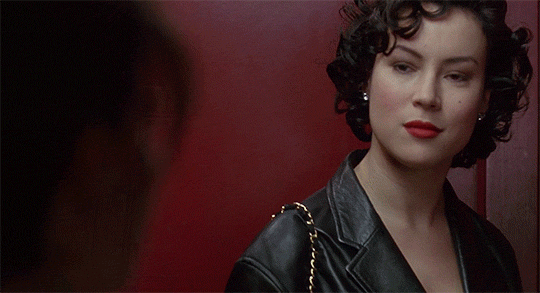
For the year this movie was made, I was actually surprised by the END of it(fuck the obsession with killing the protagonist). I didn’t really have much faith in it by how it stars, but man, I was so surprised, I loved it, be gay do crime. ★★★★☆
Gia(1998)
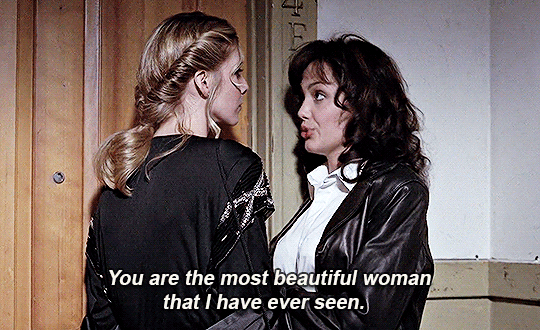
God, this movie is my new roman empire, I didn’t know about Gia’s story, but the ending of the movie DESTROYED ME. the scene where shes talking with Linda and she says: now we have all the time in the world, I was so moved by it, I loved it. It’s currently one of my favorite movies.★★★★★
Lost and delirious(2001)

ugh shakespearean shit, this movie touches more than one of us when it comes to the experience of liking girls. I liked it but I felt like there was a lot of wasted potential that could’ve made it great, tbh i just wanted Paulie to be happy; the fact the Piper Perabo is in it helps the score too. ★★★☆☆
D.E.B.S.(2004)
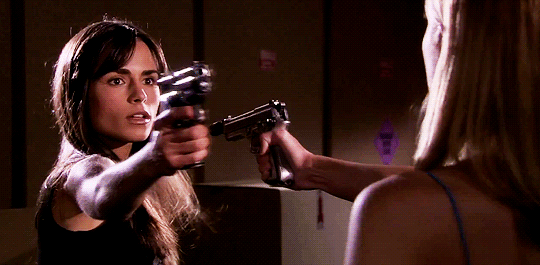
ITS THE BEST FUCKING MOVIE IN THE WORLD, GOD. I actually hated this movie before watching it ‘cause I thought it was some dumb comedy, but god, when I gave it a chance it BLEW ME AWAY. If you want to see some lesbian spies enemies to lovers shit watch debs. ★★★★★
My summer of love(2004)

Personally, I HATED this movie kjj, I didn’t really get ANYTHING at all, like it felt like everything was just too rushed??? like when did they even fall in love lol? Gets points just for Emily Blunt. ★★☆☆☆
Imagine me & you(2005)

Piper Perabo again and Lena Heady THE WOMAN. This movie is ART, my fav movie, it’s beautiful, comfort movie af. The true don’t let your husband keep you from meeting your future wife. ★★★★★
Loving Annabelle(2006)

This movie was made for all of us who once liked a teacher or profesor. I liked it quite a lot, but I feel like seize it’s true potential. Personally, I choose to think that the alternative ending it’s the true one lol. ★★★☆☆
Bloomington(2010)

Again for us that like fantasizing about our teachers. I like this movie but again, I feel like they didn’t really make the most of it jskdja annoying af bitching about the same but yeah, it bothered me. Anyway, i liked the movie, and I didn’t like the ending at all,I felt bad for the poor teacher :c. ★★★☆☆
A perfect ending(2012)

I know a lot of people hate this movie and think it’s shit, but I personally love it lol. Idk I remember that when I watched it it got me super emotional and i liked it a lot, dont care what anyone says to me it’s a good movie. ★★★☆☆
The girl king(2015)
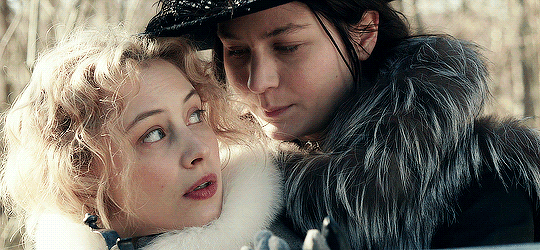
★☆☆☆☆
Didn’t like it at all, boring af, i didn’t really get it, idk, i was expecting more. ★☆☆☆☆
First girl i loved(2016)

Im fond of this movie, it was one of the first ones I saw, the ending just made a me a bit frustrated, but I liked it, Brianna Hildebrand with a wig funny as hell. ★★★☆☆
Disobedience(2017)

Rachel Weisz and McAdams DAMN. Great movie, I liked it in all aspects. Although the ending wasn’t what I expected I still liked it. ★★★★★
Tell it to the bees(2018)
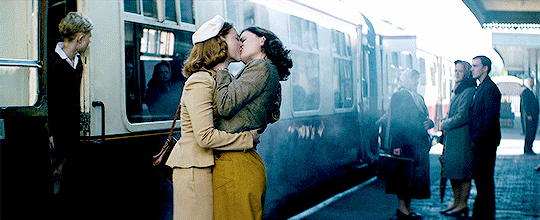
Mmm I think this movie is kinda meh, like it’s okay but I feel like it lacks something for me to like it, tho I didn’t get the ending, like I don’t understand the decisions each one took. ★★☆☆☆
Ammonite(2020)
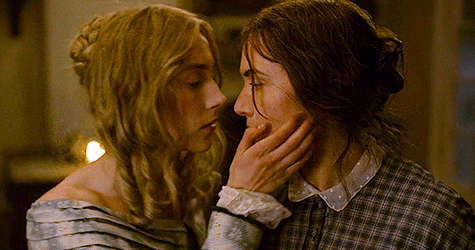
Kate Winslet and Saoirse Ronan!!!! I liked it but I didn’t love it, I never got to understand if Mary hated or loved Charlotte. The ending got me frustrated!!! ★★★☆☆
Crush(2022)

The kind of movie you gotta watch after Gia, I liked it I thought it was silly, like very much teenage romcom sort of shit, like the Kissing Booth but for lesbians. ★★★☆☆
You can live forever(2022)

I think this is a great movie, interesting story, I wasn’t expecting the whole ending sequence, what Marike says to Jamie destroyed me, in my head theyre the young version of the Disobedience ones. ★★★★★
Booksmart(2019)
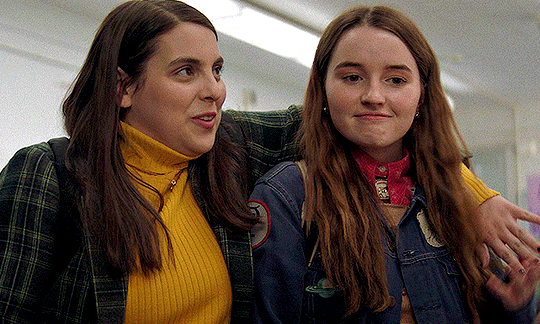
GREAT MOVIE, very entertaining and funny, I liked it quite a lot, it’s perfect to watch it with friends. Gigi is just like me fr best character ever. ★★★★★
#wlw#sapphic#lesbianism#movies#wlw movies#lgbtq community#lgbtq#queer#queer community#lesbian#woman#booksmart#bound#gia#rachel weisz#rachel mcadams#saoirse ronan#kate winslet#piper perabo#rowan blanchard#angelina jolie#debs 2004
187 notes
·
View notes
Text
The voices in my Wish Rewrite
I haven’t talked much about it, but in my Wish rewrite some characters would be recasted. I wanted to make this post just to show which actors I’d replace… And it’s pretty much everyone except Magnifico, cause ya know, Chris Pine is Magnifico, and Magnifico is Chris Pine, it’s just how it is.
So let’s get this started!
Asha- Denée Benton

Im absolutely OBSESSED with this woman’s voice, she sounds like an angel and carries so much personality in her performance, she sounds pure, youthful, hopeful but also strong, everything I imagine Asha as. THIS is what I imagine the 100th anniversary Disney princess sounding like. Not that I didn’t like Ariana DeBose’s singing tho, but I just love Denee Benton more, and hey, it’s my rewrite, so I get to imagine Asha’s voice how I please. Also I can totally see Asha and Aster singing this song.
Aster- Jordan Fisher
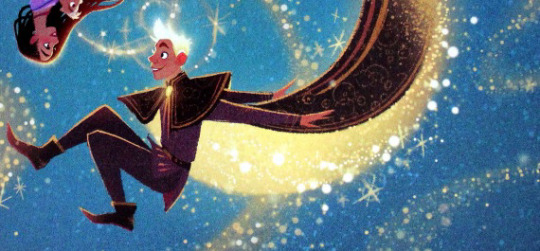
Oooooh this man, I love him so much. His voice has the perfect energy for Aster, sounding youthful and melodic like a prince, it had to be a literally other worldly voice, and I think Jordan’s voice is PRETTY DANG other worldly, like, this example I found on Spotify doesn’t even do him justice, go listen to his other singing chops on YouTube.
If you look up Jordan Fisher you’ll see the guy is DEEPLY connected with Disney in his career, from singing the song “Happily Ever After” 6 years ago, which is the theme song for the Magic Kingdom, to now being the main singer of 4-town in the movie Turning Red. And of course this one time he made a cover of “You’re Welcome”, the guy just lives and breaths Disney so WHY NOT have him as a wishing star? It just makes sense. But besides working with Disney he also has experience in a musicals such as Hamilton, Dear Evan Hansen, Sweeney Todd and more recently he became the new Orpheus in Hadestown… And by god I need a good quality audio of him singing “Wait For Me” more than I need air because that song fits Aster’s character SO WELL.
Magnifico- Chris Pine
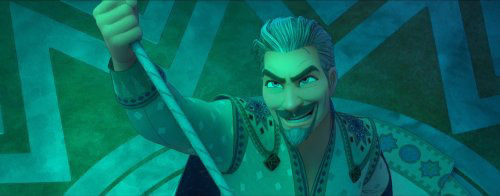
Yeah no surprises here, you can’t have Magnifico without Chris Pine… But HIS SINGING VOICE IN THIS SONG THOUGH??? ITS SO GOOD!!! I listened to “Any Moment” ONCE and now I constantly go back to listen to it over and over and imagine young Magnus and Amaya meeting in the woods. I still haven’t posted about Amaya’s backstory BECAUSE IM TOO LAZY TO FINISH THE DRAFT I HAVE EXPLAINING IT- But let me just say her hesitating to start a relationship with him is VERY accurate to her character. And Magnus being like “May I kiss you” out of nowhere because he: 1- Sees himself as irresistible so he thinks she’d fall for him with just that and 2- he had 0 social skills before he met Amaya.
And then there’s the line “Life is often so unpleasant, you must know that as a peasant” ARE YOU KIDDING ME?! This is LITERALLY something my Magnifico would say, I’m so freakin lucky!
My point is, my rewrite’s Magnifico sounds like THIS when he sings, with a deep, smooth and honeyed voice that makes you want to trust him… Take that high pitched voice Chris Pine did in “This Is The Thanks I Get” and throw it out the window. Disney wasted the man’s talent. I’m so mad.
Amaya- Emily Blunt
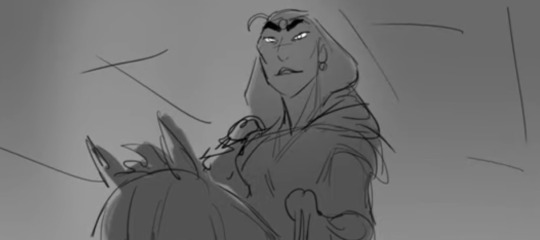
Do you guys see my vision? Do I even have to say anything? Like really, go watch a scene of the Mary Poppins remake, any scene with her at all, that woman has a voice that DEMANDS respect, while also being motherly, it’s practically perfect in every way. I’m using “Open Up Your Eyes” here as an example though because… Well, it fits her backstory… Ya know, the backstory I’m stalling to talk about 👉👈… But it also just simply fits her personality in general!
And no disrespect for her voice in the movie, Angelique Cabral… BUT ITS EMILY BLUNT AS AN EVIL QUEEN!!! Come ooooon! It’s just meant to be!!!
Also side note, since we’re talking about Queen Amable, THIS design that came from an deleted scene is how I’ve imagined her the whole time:

Like, I could not STAND her hairstyle in the movie, it simply didn’t fit my vision for her character, see, Amaya is sophisticated but she’s also… Practical and likes to feel comfortable, hence why in my rewrite her dress has no sleeves, she values her own comfort more than conforming to the social norms… AND THAT HAIR LOOKING LIKE HEADPHONES WITH THAT CROWN THAT MADE HER FOREHEAD LOOK LIKE A SQUARE DROVE ME NUTS!
So yeah, this is our Queen Amable, voiced by Emily Blunt, with a British accent, in all her glory, we’re moving on.
Valentino- Gregory Mann

This is just a bonus mention, since Valentino doesn’t even sing in my rewrite, he just speaks in like 3 scenes… And you guys have only seen one of them so far. But either way, let it be known he sounds like Gregory Mann, because Gregory Mann sounds adorable. That is all.
Thank You For Reading!
#Spotify#disney wish#wish rewrite#wish#wish 2023#wish star#wish disney#disney#wish movie#wish reimagined#wish asha#kingdom of wishes
93 notes
·
View notes
Text
The Other’s Choice • Pt. 1
Credit to @winterxisxcomingx for the beautiful banner ♡︎

SPOILERS FOR HAZBIN HOTEL ~ Read ahead at your own risk!
Faced with the harsh reality of Heaven’s steadfast opposition, the angel of joy is forced to make a drastic decision with gruesome consequences, but luckily she isn’t alone for long.
WARNINGS: Abrahamic imagery (obviously), pseudocest, assault, extreme heights, hunger
Part I • Part II • Part III

An eternity seemed to have passed since Emily had taken the irreversible dive from Heaven and begun her journey through Purgatory before finally manifesting in Hell’s scarlet sky. And yet there was such a long distance left between her and the ground that she still couldn’t make out a single thing happening down below. Her stomach was achingly empty—how many days had it been? It was impossible to know without the light of the sun to let her.
Her windswept hair obscuring her vision as she fell, she reflected on the moments leading up to this. They’d done it! Now even Sera couldn’t deny the reality proven by the unrelenting efforts of the Hazbin Hotel. Yet to Emily’s fury, the old hag was still too stubborn to allow word of it to get out even among the archangels.
The newly redeemed sinner, whose name she’d learnt was Sir Pentious, had appeared suddenly in Chastity Palace, somehow becoming the first human soul in history to bypass Saint Peter and the pearly gates. While the senior seraph didn’t take well to his arrival, the younger was over the moon, wasting no time befriending him and giving him the grand tour of his new, and rightful, home above the clouds. The conversations she’d shared with him were not only groundbreaking but deeply upsetting. The upsetting part, however, wasn’t the story of his noble sacrifice nor was it Adam’s brutal and shameless acts of fascism, but the fact that she couldn’t share any of it with the rest of Heaven.
Faced with this, she’d done the only other thing she could have. If there was no way for her to serve the sinners’ worthy cause in Heaven, she would simply have to leave. And so she would, but first, she’d penned a note to her elder.
Word Count: 0.8k
“I hereby vow never to return until the right changes have been made. This is not my choice, it is my duty. Thank you for protecting me, Sera. Goodbye.”
She’d never been so cold and blunt to anyone in all her aeons of life; it had destroyed her to write it, but soon regret would serve no purpose to her anymore. With a deep breath, she steadied herself and stepped with resolve toward the edge of the rainbow bridge. She closed her eyes.
Out of nowhere, all the world came to a screeching halt, the jarring loss of momentum causing her heart to nearly leap out her throat.
“I got ya.’”
A few seconds earlier, Lucifer had looked up through the glass walls of his new suite at the hotel just in time to see what could only be likened to a falling star.
Without thinking, he’d bolted into action, racing to catch the little one right as she’d started to descend past the city skyline. She could’ve been shish-kebabbed by the spire of a skyscraper if he’d taken any longer to spot her.
His heart was pounding after his miles-long sprint through the air. “You alright?”
Emily ogled up at her saviour with wide eyes, failing to realise he’d asked her a question for a good several seconds. “Y-Yes. Uh…thank you.” He didn’t look much like a demon, dressed in white from top to bottom with strawberry blond hair and a warm red gaze. If she didn’t know better, she would think this gleaming, six-winged stranger was a seraph like herself.
“You’ve fallen,” he inferred with frantic eyes and a heavy heart. “What happened?”
But her attention was already fixated elsewhere. As the angel of joy, she possessed a divine gift that let her feel the emotions of others as if they were her own. Down below, there were people on the streets, and every last one of them was miserable. It was so much worse than she could’ve imagined. There truly wasn’t an ounce of joy to be found here. She watched as one of the wretched souls was violently defiled by another before her eyes, their cries of terror ringing in her ears clear as day. The latter’s hand clenched around the former’s neck, and suddenly she couldn’t get a breath in, a scream trapped in her throat as she could do nothing but watch. She felt sick.
Lucifer sensed her rising panic and held her closer. “Hey, look at me, you’re okay,” he urged, cradling the poor, lost princess in one arm while cupping her colourless face in his free hand. She met his gaze, her own filled with the all-consuming fear she’d had the privilege of never knowing until now. She looked like a deer in the headlights, her expression like an arrow straight to his once broken and unfeeling heart. “C’mon. Let’s get you inside where it’s safe.”
Her frail arms clung to him with a vicelike grip as she nodded and tearfully hid her face in his shoulder. At once, he set his sights on Pride Castle and took off soaring.
#my writing#applewings#pride and joy#prideandjoy#pride & joy#pride&joy#lucily#lucifer x emily#emily x lucifer#lucifer morningstar#lucifer magne#lucifer hazbin hotel#hazbin hotel lucifer#emily the seraph#emily the seraphim#emily hazbin hotel#hazbin hotel emily#hazbin hotel#quillcifer 🍎🪶
52 notes
·
View notes
Text
the more i think about the fall guy 2024 the more misogynistic i think it is. i didn’t catch the amber heard/johnny depp joke when i watched but just read a post on here about it and it bugged me how unprofessional they made emily blunt’s character (eating up time discussing her relationship in front of the cast and crew + making ryan gosling redo dangerous and painful stunts just to see him suffer. i kept thinking about barbra streisand’s audio commentary on the prince of tides where she talks about things they just weren’t able to accomplish because of time. it’s crucial! i would hope this woman wouldn’t waste time like that!). if she had almost any other career i’d shrug it off but this is a movie directed by a man and written by a man so how they portray their female director lead character is very charged with meaning. they also make hannah waddingham (a producer on the film and also manager for the film’s lead actor?) a villain (won’t say more than that since this film is still pretty new). these are the female filmmakers that david leitch offers us.
11 notes
·
View notes
Text

Best Picture
The Holdovers
Oppenheimer
Killers of the Flower Moon
Barbie
Poor Things
American Fiction
Maestro
Past Lives
Anatomy of a Fall
The Zone of Interest
I think it might actually be this easy but just in case! - The Color Purple, Saltburn, Origin, Air, Napoleon
Director
Christopher Nolan - Oppenheimer
Martin Scorsese - Killers of the Flower Moon
Yorgos Lanthimos - Poor Things (most likely to get Denis Villeneuved, however)
Alexander Payne - The Holdovers
Jonathan Glazer - The Zone of Interest
Alt for Payne - Greta Gerwig - Barbie (I never thought she was getting nominated but now that more people seem to agree I'm suspicious!)
Alt for Glazer or Lanthimos - Justine Triet - Anatomy of a Fall
JUST IN CASE - J.A. Bayona - Society of the Snow
Actress (optimism!)
Lily Gladstone - Killers of the Flower Moon
Emma Stone - Poor Things
Carey Mulligan - Maestro
Sandra Huller - Anatomy of a Fall
Greta Lee - Past Lives
they'll reward her for producing the biggest hit of the year but take the performance for granted - Margot Robbie - Barbie
I simply do not buy it! - Annette Bening - Nyad
Well, - Fantasia Barrino - The Color Purple
Actor
Paul Giamatti - The Holdovers
Cillian Murphy - Oppenheimer
Bradley Cooper - Maestro
Jeffrey Wright - American Fiction (is he the secret snub?)
Leonardo DiCaprio - Killers of the Flower Moon (I was expecting him to get The Irishman-ed but I think Lily switching to lead will make them a pair)
Will look the best on the red carpet - Colman Domingo - Rustin
No<3 - Barry Keoghan - Saltburn
On the off chance they're interested in nominating a single good performance in this category - Andrew Scott - All of Us Strangers
Supporting Actress
Da'Vine Joy Randolph - The Holdovers
Emily Blunt - Oppenheimer
-----BAR OF CERTAINTY-----
Danielle Brooks - The Color Purple
-----BAR OF SEMI-CERTAINTY------
Penelope Cruz - Ferrari (she's been nominated with less support?)
Rosamund Pike - Saltburn
no legitimate awards body has nominated her without Annette Bening and I'm not predicting her either! - Jodie Foster - Nyad
it's definitely not a rage stroke - Julianne Moore - May December
do they care about the acting in this? - Sandra Huller - The Zone of Interest
nice try! - America Ferrera - Barbie
DJR is sucking up so many number 1 votes something wild is bound to happen - Rachel McAdams - Are You There God? It's Me Margaret
Supporting Actor
RDJ - Oppenheimer
Ryan Gosling - Barbie
Robert De Niro - Killers of the Flower Moon
Dominic Sessa - The Holdovers
Willem Dafoe - Poor Things
When there's two from the same movie they go with the older one - Mark Ruffalo - Poor Things
If they have to nominate someone under 50 in this category it certainly won't be for someone this pretty! - Charles Melton - May December
cannot conjure the image of a single person putting this at number 1 on their ballot - Sterling K. Brown - American Fiction
Adapted Screenplay
American Fiction
Oppenheimer
Poor Things
Barbie
Killers of the Flower Moon
This is for my people who just lost someone - The Zone of Interest, All of Us Strangers, Are You There God? It's Me Margaret
Original Screenplay
The Holdovers
Past Lives
Anatomy of a Fall
Maestro
Saltburn
They can't do three good screenplays - May December
Congrats on the WGA nominations - Air, Asteroid City
Cinematography
Poor Things
Oppenheimer
Killers of the Flower Moon
Maestro
The Zone of Interest
honestly wasteful to have shot this on film - Saltburn
am I an Ed Lachman FAN? - El Conde
Costume Design
Barbie
Poor Things
Killers of the Flower Moon
Napoleon
Oppenheimer (if EEAAO could do it)
COIN TOSS - Maestro
Film Editing
[REDACTED]
Killers of the Flower Moon
Poor Things
The Holdovers
Anatomy of a Fall
enough - Barbie
Tar voters I know you're out there - The Zone of Interest
get some help - Maestro
cars - Ferrari
Makeup & Hairstyling
Maestro
Poor Things
Golda
Oppenheimer
Killers of the Flower Moon (the BAFTA nomination is throwing me)
???? - Society of the Snow
Presumably has to get one of it's shortlists? - Napoleon
Production Design
Poor Things
Barbie
Oppenheimer
Killers of the Flower Moon
Napoleon
wish I were brave enough to predict this - The Zone of Interest
Score
Oppenheimer
Killers of the Flower Moon
Poor Things
Indiana Jones
The Zone of Interest
Alt - anything animated
[REDACTED]
the good Barbie song
the bad Barbie song
Diane Warren
Rustin
Killers of the Flower Moon
alt - American Symphony, the other good Barbie song
Sound
[REDACTED]
Maestro
Killers of the Flower Moon
Ferrari
The Zone of Interest
I feel like that's it but here's the rest of the list in descending order of likelihood - Barbie, Napoleon, The Killer, Mission Impossible, The Creator
Visual Effects
Poor Things
Marvel 32
The Creator
Godzilla
Society of the Snow
I'm bombing this category as usual - Spiderman, Napoleon, Indiana Jones
Animated
Spiderman
The Boy and the Heron
Elemental
Nimona
Teenage Mutant Ninja Turtles (really?)
every year I try to predict one of these but I've decided to learn my lesson this time - Suzume
they're running - Chicken Run
Documentary
20 Days in Mariupol
Beyond Utopia
Still: a Michael J. Fox Movie
The Eternal Memory
Bobi Wine: The People's President
FRONTRUNNER SNUB - American Symphony
possibly too experimental? - Four Daughters
International
The Zone of Interest
Society of the Snow
Fallen Leaves (BECAUSE there is nothing to get)
20 Days in Mariupol
Totem
Justine's Revenge - The Taste of Things
lmao - The Teachers' Lounge
is Danish - The Promised Land
is allegedly terrible so definitely a contender - Amerikatsi
forgot to release it - Perfect Days
what about the YAK - The Monk and the Gun
It*lian - Io Capitano
Remember taste? - Godland
#am I predicting Killers of the Flower Moon to tie the nomination record? yes#do I think that will actually happen? no#do I know where to not predict it? also no#is the zone of interest being at the end of the alphabet going to give me 7-8 heart attacks in a row during the announcement? probably
9 notes
·
View notes
Text
Okay, just finished The English on Prime. Thoughts. Beware vague spoilers!

I like how the tale winds up and down in a slow burn manner, only to slap you brutally with a dark conflict at the heart of this series that stems from a group of men wasted on military moonshine, who go commit genocide in a native village, then traipse off to a whore house called the Hog Ranch to bang the Queen of Syphilis, get tossed in water well-jail for said unsanctioned fornication while on duty not for murder, pay fines, then go spread ‘it’ to all the women in their lives-
Ahem. Anyway.
This is probably the most realistic ‘Wild West’ tale I’ve seen in a while. To see the sheer lawlessness of such a world was suffocating, you could feel the anxiety of any character meeting someone new. No one could be trusted. It was quite good, definitely dark with a slow burn. A lot of really well done things in it and it was oh so tragic at the end OMG. My heart! 🥲 Cornelia’s tale of revenge was so much darker than imagined and my heart broke for her so many times. Her being all I’m dead, I’ve been dead for years and now I’ve come for you and David being all do it do it, guess what I’m dead too and Eli just being there for her is so emotionally raw. And the scene with Cornelia trying to scrub herself clean with sand, as if she will never feel clean until she rubs her flesh off…tragedy on screen. This will be on my mind for a while.
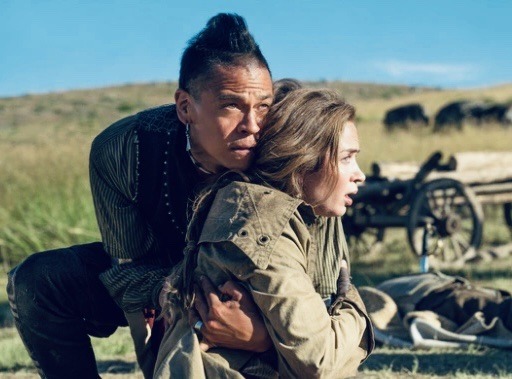
…aside from Emily Blunt being mostly clean…most of the time. That wasn’t realistic 🤣 regardless, she and Chaske Spencer were amazing. Oh, I also thought the score was on point.
#the english#the English vague spoilers#the english amazon#chaske spencer#emily blunt#the english 2022#amazon tv series#the English Amazon prime#historical#old west#old west drama#eli x cornelia#cornelia locke#eli whipp#historical drama#period drama
75 notes
·
View notes
Text
Reading "Some Desperate Glory" by Emily Tesh on @cd-container 's recommendation, I am really not far in at all but vastly enjoying Kyr's POV. She is so fucking funny. And honestly depressing because she's so hyperfixated on the impending doom of her species and everyone around her that she has ever known and the planet she was too young to ever live on let alone save, honestly it reads to me like she has OCD catastrophizing + autism (taking everything literally, being extremely focused on rules and order, flat affect, blunt to the point of coming across as callous and tactless to others. struggling to understand other's emotional responses) but I'm not sure if that was the author's intention lol. I'd be surprised if it wasn't, honestly.
Kyr had nowhere, really, to go. Cadet barracks were for sleeping; no one wasted time in the arcade but weaklings and traitors-in-waiting.
~
"What were you doing in the arcade?"
"rest and relaxation?" said Mags. "I find losing really badly at video games relaxing."
"You lose?"
"everyone loses at something, Vallie."
Kyr, who didn't, gave him a narrow look.
~
The rest of Blackbird scattered and fled past the tall figures of Sparrow, who were coming in as the last shift bells died away. Lisabel--the only one of Kyr's messmates who would pity idiot juniors--gave the remaining one a sympathetic look. Kyr pretended not to see it, because she was very fond of Lisabel.
~
Lisabel's expression was sympathetic, which was only another way to say pity. Impossible to bear the thought of being pitied by Lisabel. Lisabel was lovely, she was sweet and softhearted, Kyr was glad they'd been cadets together even if it had dragged their mess' collective training scores down, but she could not be pitied by someone like her.
#she really is just like lae'zel like god damn#reading log#mine poste#also its so obvious she's crushing on lisabel. hope you get over your internalized homophobia soon girl
5 notes
·
View notes
Text
really difficult to not pay attention to the plastic surgery Emily Blunt got, it really changed the whole shape of her face what a waste :(
#it's just unpleasant it feels weird to suddenly see new faces like that when you're used to the previous one#she was so beautiful she didn't need this at all what the hell terrible decision#bee tries to talk#emily blunt#what does hollywood do to these women jesus christ it's a massacre out there
2 notes
·
View notes
Text
'“Oppenheimer,” Christopher Nolan’s staggering film about J. Robert Oppenheimer, the man known as “the father of the atomic bomb,” condenses a titanic shift in consciousness into three haunted hours. A drama about genius, hubris and error, both individual and collective, it brilliantly charts the turbulent life of the American theoretical physicist who helped research and develop the two atomic bombs that were dropped on Hiroshima and Nagasaki during World War II — cataclysms that helped usher in our human-dominated age.
The movie is based on “American Prometheus: The Triumph and Tragedy of J. Robert Oppenheimer,” the authoritative 2005 biography by Kai Bird and Martin J. Sherwin. Written and directed by Nolan, the film borrows liberally from the book as it surveys Oppenheimer’s life, including his role in the Manhattan Engineer District, better known as the Manhattan Project. He served as director of a clandestine weapons lab built in a near-desolate stretch of Los Alamos, in New Mexico, where he and many other of the era’s most dazzling scientific minds puzzled through how to harness nuclear reactions for the weapons that killed tens of thousands instantly, ending the war in the Pacific.
The atomic bomb and what it wrought define Oppenheimer’s legacy and also shape this film. Nolan goes deep and long on the building of the bomb, a fascinating and appalling process, but he doesn’t restage the attacks; there are no documentary images of the dead or panoramas of cities in ashes, decisions that read as his ethical absolutes. The horror of the bombings, the magnitude of the suffering they caused and the arms race that followed suffuse the film. “Oppenheimer” is a great achievement in formal and conceptual terms, and fully absorbing, but Nolan’s filmmaking is, crucially, in service to the history that it relates.
The story tracks Oppenheimer — played with feverish intensity by Cillian Murphy — across decades, starting in the 1920s with him as a young adult and continuing until his hair grays. The film touches on personal and professional milestones, including his work on the bomb, the controversies that dogged him, the anti-Communist attacks that nearly ruined him, as well as the friendships and romances that helped sustain yet also troubled him. He has an affair with a political firebrand named Jean Tatlock (a vibrant Florence Pugh), and later weds a seductive boozer, Kitty Harrison (Emily Blunt, in a slow-building turn), who accompanies him to Los Alamos, where she gives birth to their second child.
It’s a dense, event-filled story that Nolan — who’s long embraced the plasticity of the film medium — has given a complex structure, which he parcels into revealing sections. Most are in lush color; others in high-contrast black and white. These sections are arranged in strands that wind together for a shape that brings to mind the double helix of DNA. To signal his conceit, he stamps the film with the words “fission” (a splitting into parts) and “fusion” (a merging of elements); Nolan being Nolan, he further complicates the film by recurrently kinking up the overarching chronology — it is a lot.
It also isn’t a story that builds gradually; rather, Nolan abruptly tosses you into the whirl of Oppenheimer’s life with vivid scenes of him during different periods in his life. In rapid succession the watchful older Oppie (as his intimates call him) and his younger counterpart flicker onscreen before the story briefly lands in the 1920s, where he’s an anguished student tormented by fiery, apocalyptic visions. He suffers; he also reads T.S. Eliot’s “The Waste Land,” drops a needle on Stravinsky’s “The Rite of Spring” and stands before a Picasso painting, defining works of an age in which physics folded space and time into space-time.
This fast pace and narrative fragmentation continue as Nolan fills in this Cubistic portrait, crosses and recrosses continents and ushers in armies of characters, including Niels Bohr (Kenneth Branagh), a physicist who played a role in the Manhattan Project. Nolan has loaded the movie with familiar faces — Matt Damon, Robert Downey Jr., Gary Oldman — some distracting. It took me a while to accept director Benny Safdie as Edward Teller, the theoretical physicist known as the “father of the hydrogen bomb,” and I still don’t know why Rami Malek shows up in a minor part other than he’s yet another known commodity.
As Oppenheimer comes into focus so does the world. In 1920s Germany, he learns quantum physics; the next decade he’s at Berkeley teaching, bouncing off other young geniuses and building a center for the study of quantum physics. Nolan makes the era’s intellectual excitement palpable — Einstein published his theory of general relativity in 1915 — and, as you would expect, there’s a great deal of scientific debate and chalkboards filled with mystifying calculations, most of which Nolan translates fairly comprehensibly. One of the film’s pleasures is experiencing by proxy the kinetic excitement of intellectual discourse.
It’s at Berkeley that the trajectory of Oppenheimer’s life dramatically shifts, after news breaks that Germany has invaded Poland. By that point, he has become friends with Ernest Lawrence (Josh Hartnett), a physicist who invented a particle accelerator, the cyclotron, and who plays an instrumental role in the Manhattan Project. It’s also at Berkeley that Oppenheimer meets the project’s military head, Leslie Groves (a predictably good Damon), who makes him Los Alamos’ director, despite the leftist causes he supported — among them, the fight against fascism during the Spanish Civil War — and some of his associations, including with Communist Party members like his brother, Frank (Dylan Arnold).
Nolan is one of the few contemporary filmmakers operating at this ambitious scale, both thematically and technically. Working with his superb cinematographer Hoyte van Hoytema, Nolan has shot in 65 mm film (which is projected in 70 mm), a format that he’s used before to create a sense of cinematic monumentality. The results can be immersive, though at times clobbering, particularly when the wow of his spectacle has proved more substantial and coherent than his storytelling. In “Oppenheimer,” though, as in “Dunkirk” (2017), he uses the format to convey the magnitude of a world-defining event; here, it also closes the distance between you and Oppenheimer, whose face becomes both vista and mirror.
The film’s virtuosity is evident in every frame, but this is virtuosity without self-aggrandizement. Big subjects can turn even well-intended filmmakers into show-offs, to the point that they upstage the history they seek to do justice to. Nolan avoids that trap by insistently putting Oppenheimer into a larger context, notably with the black-and-white portions. One section turns on a politically motivated security clearance hearing in 1954, a witch hunt that damaged his reputation; the second follows the 1959 confirmation for Lewis Strauss (a mesmerizing, near-unrecognizable Downey), a former chairman of the U.S. Atomic Energy Commission who was nominated for a Cabinet position.
Nolan integrates these black-and-white sections with the color ones, using scenes from the hearing and the confirmation — Strauss’ role in the hearing and his relationship with Oppenheimer directly affected the confirmation’s outcome — to create a dialectical synthesis. One of the most effective examples of this approach illuminates how Oppenheimer and other Jewish project scientists, some of whom were refugees from Nazi Germany, saw their work in stark, existential terms. Yet Oppenheimer’s genius, his credentials, international reputation and wartime service to the U.S. government cannot save him from political gamesmanship, the vanity of petty men and the naked antisemitism of the Red scare.
These black-and-white sequences define the last third of “Oppenheimer.” They can seem overlong, and at times in this part of the film it feels as if Nolan is becoming too swept up in the trials that America’s most famous physicist experienced. Instead, it is here that the film’s complexities and all its many fragments finally converge as Nolan puts the finishing touches on his portrait of a man who contributed to an age of transformational scientific discovery, who personified the intersection of science and politics, including in his role as a Communist boogeyman, who was transformed by his role in the creation of weapons of mass destruction and soon after raised the alarm about the dangers of nuclear war.
François Truffaut once wrote that “war films, even pacifist, even the best, willingly or not, glorify war and render it in some way attractive.” This, I think, gets at why Nolan refuses to show the bombing of Hiroshima and Nagasaki, world-defining events that eventually killed an estimated 100,000 to upward of 200,000 souls. You do, though, see Oppenheimer watch the first test bomb and, critically, you also hear the famous words that he said crossed his mind as the mushroom cloud rose: “Now I am become death, the destroyer of worlds.” As Nolan reminds you, the world quickly moved on from the horrors of the war to embrace the bomb. Now we, too, have become death, the destroyers of worlds.
***'
#Oppenheimer#Christopher Nolan#American Prometheus: The Triumph and Tragedy of J. Robert Oppenheimer#Ernest Lawrence#Josh Hartnett#Kai Bird#Martin J. Sherwin#Cillian Murphy#Jean Tatlock#Florence Pugh#Kitty#Emily Blunt#T.S. Eliot#The Waste Land#Stravinsky#“The Rite of Spring”#Niels Bohr#Kenneth Branagh#Matt Damon#Robert Downey Jr.#Gary Oldman#Benny Safdie#Edward Teller#Rami Malek#Einstein#Frank Oppenheimer#Dylan Arnold#Hoyte van Hoytema#François Truffaut#Dunkirk
0 notes
Text





I painted this Duncan Shadow Louca Titan using pieces of failed prints (I was having a zillion issues with my Ender 3, but finally got it working again). So rather than letting the pieces go to waste, I built this guy and painted him! I could have filled in the gaps and smoothed out the layer lines, but I didn’t have the patience. I just wanted to do a decent paint job. And I’m actually pretty happy with it!
*Fun fact. I finished the whole new Emily Blunt series “The English” on Amazon Prime while painted this. I don’t know if that’s a good or bad thing because that’s 6 1-hour episodes! 😅
#dnd#dungeons and dragons#art#rpg#tabletop#game#role playing#pathfinder#miniatures#minis#painted#painter#artist#giant#Titan#Duncan shadow Louca#3d#print#Ender 3#warhammer
19 notes
·
View notes
Text
What’s Up Tumblr!
- I only have about a month left of summer off before a new school year arrives before I’m back to the grind of Monday through Friday. I’m going to start having to condition my body to get ready to be back up at 6 AM. I’m spoiled over here and get to wake up around 10:30 AM daily.
- Last Saturday I saw Counting Crows and Dashboard Confessional in Atlantic City. I had one of those wild nights I’ll just say that. As I was waiting in line to get into the venue a couple from Delaware asked me if I was by myself. I told them I was, so they told me their friend who was 7 months pregnant couldn’t make the show and that they had an extra VIP PIT ticket. I had a cheap ticket and was just content on being at the show. They ended up giving it to me, a 300 dollar ticket mind you. I went in with them and was able to get in before everyone else and we had our own section in the front right next to the stage. I must have thanked this couple numerous times but they didn’t want the ticket to go to waste so they were happy to give it to me. It was a very generous act of kindness and they were so sweet. It’s something being up there in a VIP area, there were women in evening dresses and high heels. That’s probably not the best concert attire but hey they were doing their thing!. It was a great vibe though and both bands were fantastic. Dashboard is always really good (I would say they are a solid take your girl to see kinda bands) and I was actually surprised how insanely good Counting Crows were live. I would 1000% see them again.
- This past Sunday night it was back to the punk house for me! So I went to see Captain, We’re Sinking! If you’re reading this you’re probably like “Nope Chal, no idea who the hell that is” Basically, they are a punk band from Scranton, PA and the singer is the brother of Greg Barnett from The Menzingers (who was in attendance to watch his brother!). I got to this show and I didn’t get the memo that this was basically all friends and family (girlfriends, wives, brothers, sisters, you name it). Everyone knew each other, I would say that there were 150 people? So just imagine me standing there and people coming up hugging each other left and right and saying “Omg you made it, I haven’t seen you in forever”. I decided just to go with the flow and damn was that show fun. I was pretty much having the time of my life up front singing along to every song. Captain, We’re Sinking are GROSSLY underrated. I struck up conversation with them after their set and they appear to be fine gentlemen. The tall guy, Ben, from Tigers Jaw played bass for them tonight and is always pretty outgoing.It’s cool to see when people are like that and not into themselves.
- I need to be in and around a pool soon. It’s going to be 99 Friday here in Philly so floating in a pool would be ideal. It’s one of those does anyone know a friend with a pool? I’ll bring you alcohol or wine!
- I saw Oppenheimer yesterday and it was great! I didn’t know a three hour biopic would hold my attention but everyone brought their A game as it was a selection of an extremely talented cast. Easily a career performance from Cillian Murphy. Emily Blunt was equally as captivating as his wife and I would be surprised if a nomination did not come her way. Also to my guys reading this... ladies feel free to roll your eyes at me... but Florence Pugh’s tiddies. *Chef’s kiss*
- Only 98 more days till Halloween, this is your fair warning that spooky season is on the horizon. Somewhere there’s a woman right now dancing in a Spirit Halloween store.
2 notes
·
View notes
Text
We’re back from Oppenheimer. It was definitely good, 8/10, but I think I may have been expecting a little more based on the critical glow surrounding the film. It wasn’t bad, but it’s not my favorite Nolan film. Also, I think Emily Blunt and, to a lesser extent, Florence Pugh were probably wasted on this material. Their parts were underwritten. My partner made an interesting point: the WGN drama series Manhattan (2014-2015) was actually better at putting the viewer in the world of Los Alamos leading up to the Trinity test. For her, the best part of the film was the way it captured the political aftermath, namely, Oppenheimer’s AEC security clearance hearing and Strauss’ cabinet hearing in the Senate. I can’t disagree. Speaking of Strauss, RDJ was really, really good. I always thought he was a great Iron Man, but it’s nice to see him finally doing something with a bit more substance to it.
6 notes
·
View notes
Text
Oppenheimer
Oppenheimer
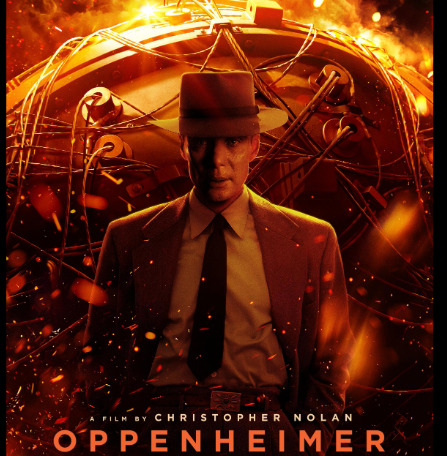
Christopher Nolan is one of the important names in modern cinema, he has a style that next to no one can emulate. This goes for his writing style and cinematography; in his latest creative endeavor, we see him doing what he loves: making art. So, let’s talk about Oppenheimer!
Oppenheimer is about the titular theoretical physicist J. Robert Oppenheimer, whose scientific knowledge led to the bombing of Hiroshima.
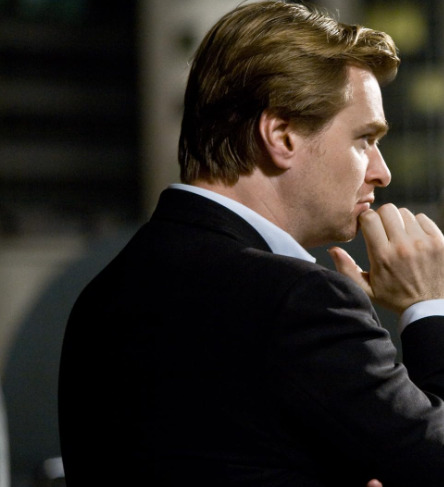
First, Christopher Nolan displays his usual level of artistry in this film. Choosing not to go for linear storytelling was quite the gambit, but one that paid off; I never looked away for a second, and it almost felt like a puzzle to piece together how things would play out. Given that this was a biopic, I did not expect too much outside of the realm of possibility; but I clearly forgot who I was dealing with. He implemented as much surrealistic cinematography as the film would allow, and it was some of his best.
Nolan is a master of the concept of “show, don’t tell” and nailed it here.
That’s enough of me squealing like a fan girl, everyone knows that the director is a technical genius, but we also know that as a screenwriter, he tends to come off as pretentious, and he did the thing here.
There was no shortage of cliches present here, but that was unavoidable when trying to stay true to the many incidents that Oppenheimer was involved in. But he’s never been a strong screenwriter, to begin with.
And while I am a huge fan of the dying art of practical effects in film, the makeup work did nothing to hide who was under it, and at times it was laughable.
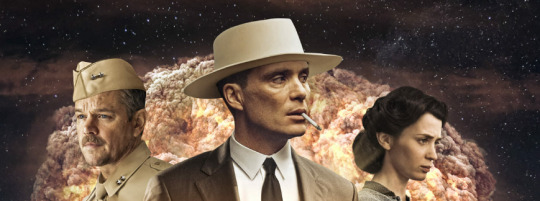
The cast was a Hollywood who’s who list, and they brought their A-game, Robert Downey Jr., fresh from his recuperation from franchise fatigue showed why he was one of the best in the game, as did Emily Blunt and Florence Pugh. The number of Hollywood A-listers proved why Nolan’s name still carries so much weight in the industry and there were far too many to name.

But the most standout performance was easily Cillian Murphy, who has been one of Nolan’s longest collaborators. And to pull off a Midwest accent when he has a strong brogue is impressive. The word pathos is thrown around frequently, but when you look back on the history of the protagonist, the term is accurate for Murphy’s performance.
Nolan films never play around with their score, and composer Ludwig Görannson meant business. Check out his catalog if you don’t believe me.
Oppenheimer is Oscar bait, everyone knows that, but it’s at least well made and some of Nolan’s contemporaries could stand to learn from his example. Not a perfect film by any means, 3 hours plus hours has never been one of my favorite numbers when it comes to length, but nothing about that time felt wasted.
I also want applaud the cast for the decision to leave the premiere to join the writers strike. In order to protect the future of not only cinema, but the arts as a whole. As a fellow artist, I support them.
I give Oppenheimer a 4 out of 5.
#movie review#cinema#oppenheimer#atomic bomb#robert downey jr#cillian murphy#emily blunt#florence pugh#writers strike#christopher nolan#hollywood
3 notes
·
View notes
Text
Corinne Guyot
(Brianne Landry’s mother)
Corinne is a fiercely independent woman. Heiress of the Guyot fortune. A freelance interior designer for Parisian elite. Her work has been featured in European luxury design magazines. She only takes on a few contracts a year to fill in some time since she decidedly does not play a role in the Guyot’s real estate empire unless she wants to (for instance, minor consulting on property renovations).
From the herringbone pattern wooden floorboards to the handmade side chairs and coffee tables, the interior of Brianne’s North Oak estate was entirely managed by Corinne. Trust in her mother’s judgment to handle her design preferences was simply trust in her skills. Other than that, mother and daughter are complete opposites.
Unlike Brianne, Corinne is a free spirit who lives ostentatiously with her wealth, spending money like water. Constantly on holiday, one might call her, and that includes impromptu visits to see her daughter wherever the corp transferred her. She never stays long (sometimes just a day with a layover), is always on the move, ready to explore the next resort.
Corinne remains single and claims she is better for it. Marrying Henry Landry, COO of Arasaka Bank, ECC, is called a “mistake” by a young woman overly infatuated (it was a marriage not arranged as is common). She never wanted children but agreed for her husband. Their daughter was often in the care of nannies (and Henry’s mother, Victoria Anne Landry, who had the greatest influence on Brianne’s kind disposition). However, it should be said that this is not unlike most rich children’s upbringings among parents too busy to parent. Her discontent in London would be remedied by divorce when Brianne was nearing four. Shared custody meant Brianne spent short summers and holidays with her mother in Paris or wherever she desired to travel.
Despite their differences in personality, the two accept each other’s peculiarities. They do bicker quite often and Brianne admits to being tested whenever in her mother’s vicinity, but it is a stable relationship. It was Corinne who gave Brianne the courage to divorce her husband; a story for another time. [Corinne’s fc and personality below the cut].
undefined
youtube
bri and her maman side by side (starts 12 seconds in). yes, i do realize how on point this fc is (:
undefined
youtube
Personality is very much alike to Sylvie from Emily in Paris. A blunt boss of a woman, always fashionable, always feels like you’re wasting her time.
#𝗣𝗥𝗢𝗙𝗜𝗟𝗘 :「 brianne landry | headcanon 」.#⚘ ˚◞ npc. corinne guyot ◞ .#(( if i am going to write a hc for any member of bri's fam - it'll be her mum ))#Youtube#𝗣𝗥𝗢𝗙𝗜𝗟𝗘 :「 headcanon 」.#⚘ ˚◞ headcanon ◞ 𝒾 𝓀𝑒𝑒𝓅 𝓂𝓎 𝒽𝑒𝒶𝒹 𝑜𝓃 𝒷𝒶𝒸𝓀𝓌𝒶𝓇𝒹𝓈 𝓉𝑜 𝒻𝒾𝓃𝒹 𝒶𝓃 𝒶𝓃𝓈𝓌𝑒𝓇.#⚘ ˚◞ headcanon ◞ 𝓉𝒽𝑒 𝓌𝒶𝓋𝑒𝓈 𝓌𝑜𝓃’𝓉 𝒻𝑜𝓇𝑔𝒾𝓋𝑒 𝓎𝑜𝓊.
6 notes
·
View notes